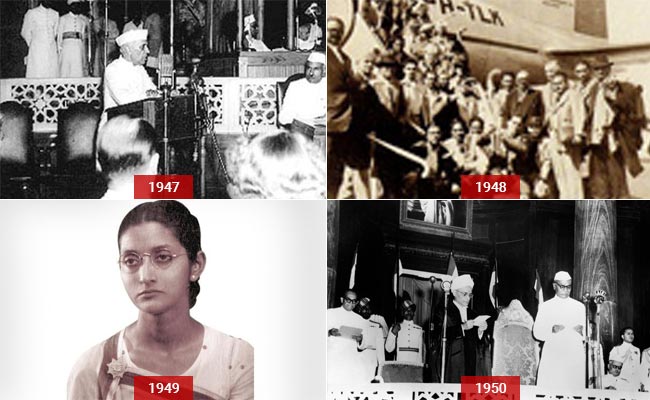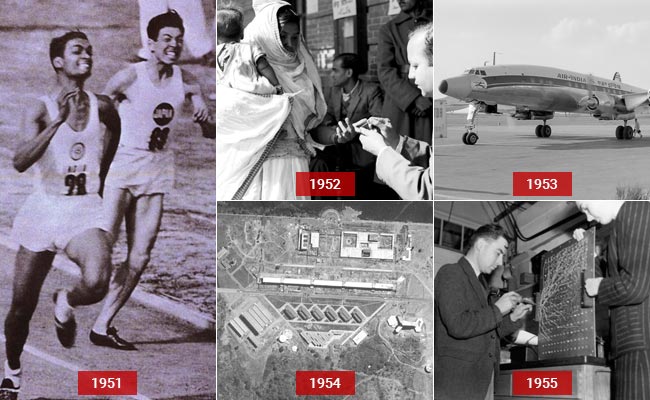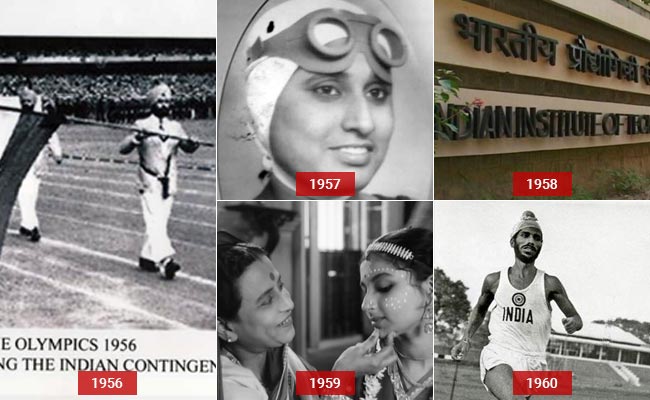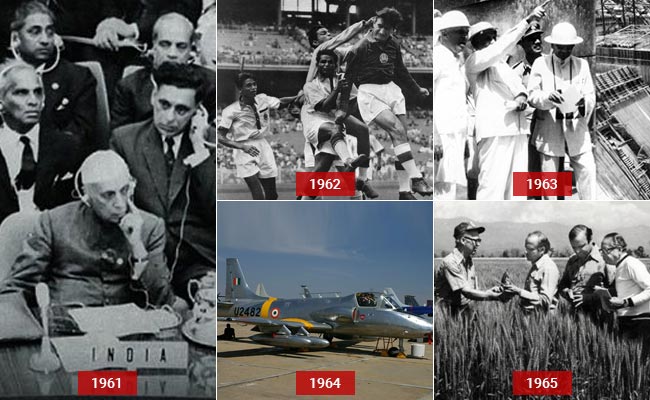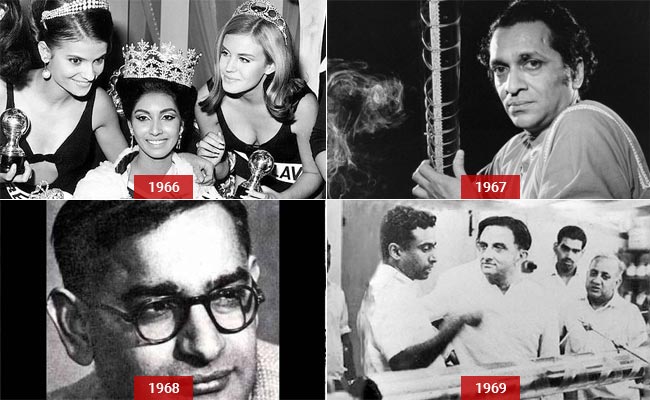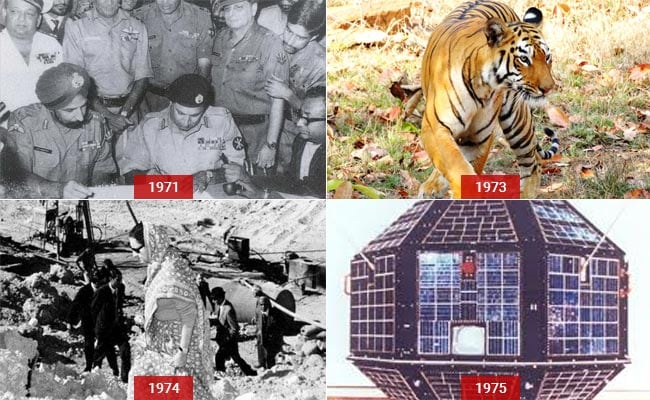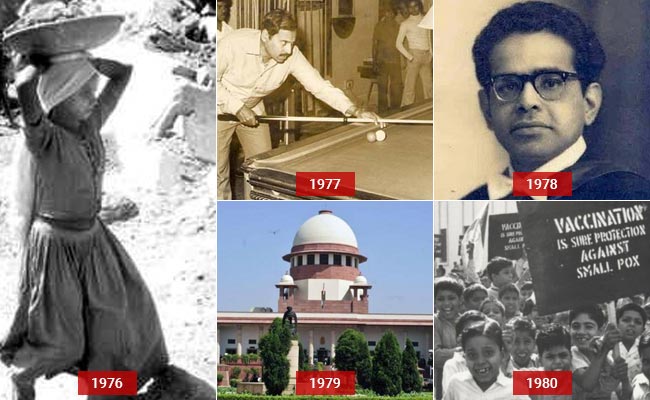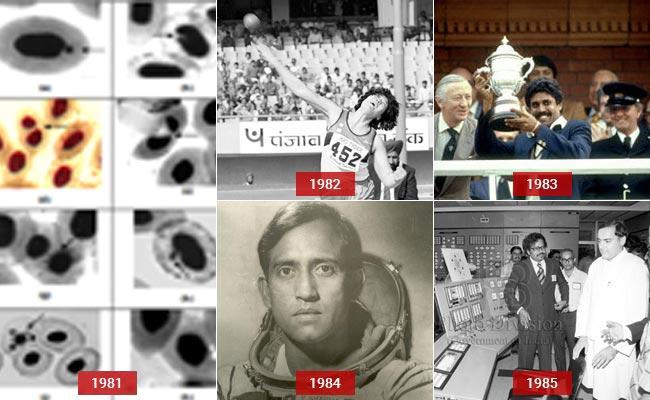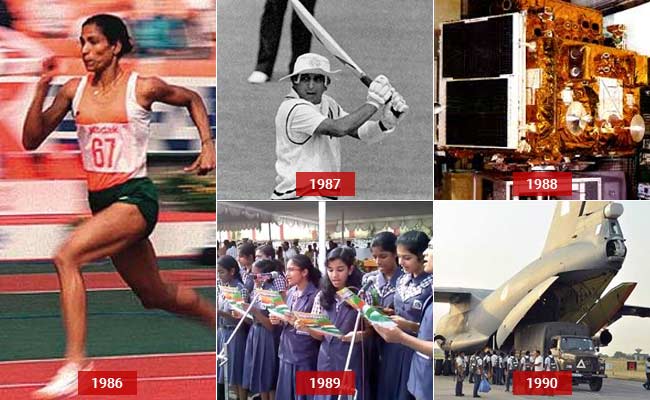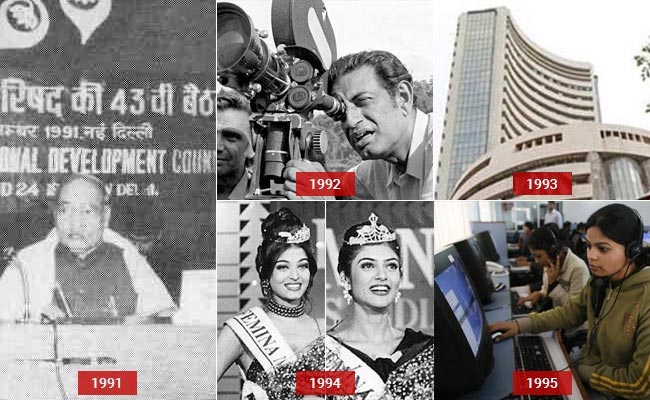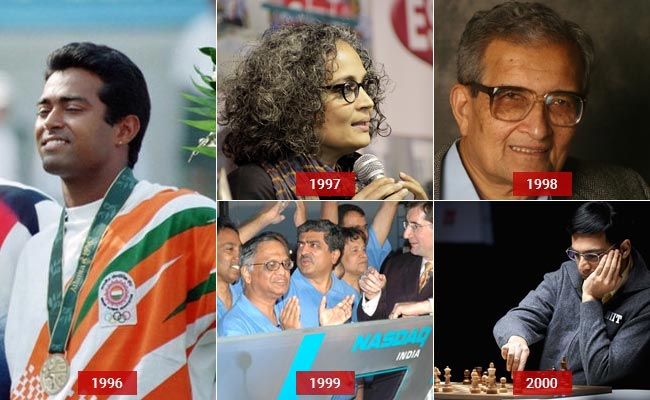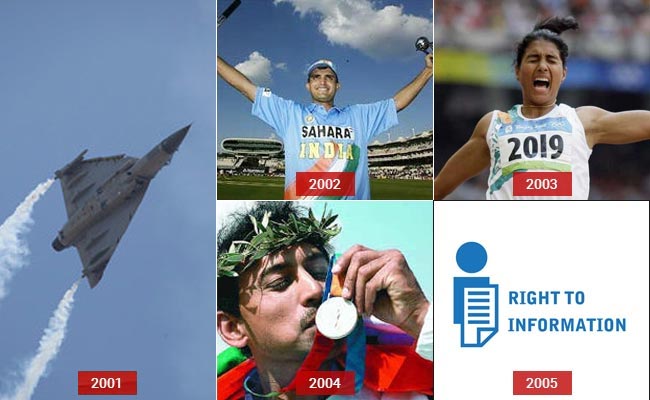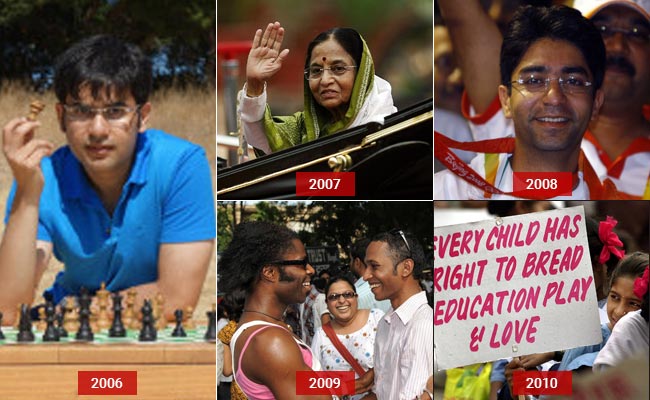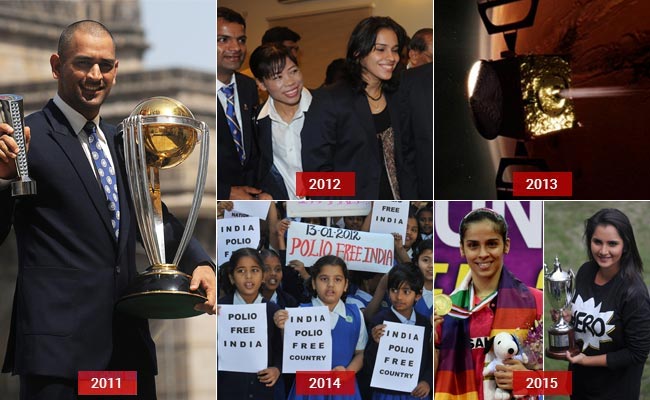70 Milestones In 70 Years, Happy Independence Day
A glimpse of 70 major events in India after it attained independence on 15th August, 1947.
-
A year after India achieved independence in 1947, its men's hockey team won the first gold medal for the country at the 1948 London Olympics. The next year Muthamma Beliappa became the first woman to pass the Indian Administrative Services exam. In 1950, India adopted its constitution becoming a full-fledged republic. (Images sourced from Wikimedia commons, Maharashtra Hockey Association limited, Mea.gov.in, AFP archives)
-
India successfully hosted the first edition of the Asian Games in 1951. The next year, India held its first elections, in which 170 million cast their vote. Flag carrier Indian Airlines was set-up in 1953. India also became the first nation to launch an atomic energy program in 1954 at Trombay. In 1955, India's first computer, HEC 2M was installed in Kolkata. (Images sourced from Ocasia.org, Photodivision.gov.in, Wikipedia/ commons, Seattle public library)
-
In 1956, the Indian hockey team won gold at the Melbourne Olympics. Arati Saha became the first Asian to successfully cross the English Channel in 1957. The establishment of the Indian Institutes of Technology in 1958 set the standard against which educational excellence would be measured for decades. In 1959, Satyajit Ray's ‘Apur Sansar' elevated Indian cinema to the international stage. Milkha Singh's became the first Indian to shatter an Olympic record in 1960. (Images sourced from static.sportskeeda.com, Wikipedia commons, iitkgp.ac.in, NDTV archives)
-
India took leadership position in the first ever meeting of Non-Aligned Countries in 1961. A year later India's football team reached its highest ranking by winning gold at the 1962 Asian Games. Next year Prime Minister Nehru dedicated the Bhakra-Nangal Dam project to the country, calling it a ‘temple of modern India.' In 1964, the first Indian jet trainer HJT-16 took flight. The ‘Green Revolution' to end India's food grain import dependency was started in 1965. (Images sourced from Lse.ac.uk, sports-nova.com, Photodivision.gov.in, aeroprints.com via Wikimedia Commons, natureasia.com)
-
In 1966, Rita Faria became the first Indian to win the Miss World crown. A year later Pandit Ravi Shankar bagged India's first Grammy award. In 1968 Dr Profulla Sen became only third in the world, and the first in Asia to perform a heart transplant surgery. Indian Space Research Organization was founded in 1969. (Images sourced from sim05.in.com, Grammy.com, isro.gov.in)
-
In 1971 India helped Bangladesh achieve independence from Pakistan through military intervention. Project Tiger, India's most successful animal conservation program, was launched in 1973. A successful peaceful nuclear test in 1974 surprised the world, but helped India accelerate its nuclear energy program. In 1975, with the launch of the Aryabhatt, India entered an elite club of nations with their own satellites. (Images sourced from Indian Navy via Wikimedia Commons, commons.wikimedia.org, Nilesh Noor on Twitter, vssc.gov.in)
-
Abolition of bonded labour in 1976 was a landmark step towards achieving social justice in India. The next year Michael Ferreira won the World Billiards Championship in Melbourne. India's first test-tube baby, Durga was born in 1978. Perhaps in one of the most significant judicial innovations anywhere in the world, Public Interest Litigation was legitimized by the Supreme Court in 1979. India joined the world in eradicating small-pox through one of the longest running vaccination programs in the world in 1980. (Images sourced from cuesportsindia.com, Wikipedia commons, NDTV archives, york.ac.uk)
-
Indian scientists synthesized their first drug Tromaril after 16 years of hard work in 1981. The next year, India hosted a glittering Asiad Games in New Delhi. In 1983, Kapil Dev's team lifted the cricket world cup in London. Rakesh Sharma took the dreams of millions with him to space as India's first cosmonaut in 1984. India becomes sixth country in the world to possess a Fast Breeder Nuclear Reactor in 1985. (Images sourced from iitrindia.org, Photodivision.gov.in, Indianairforce.nic.in)
-
PT Usha smashed records on her way to a historic medal haul at the Asian Games in 1986. In 1987 Sunil Gavaskar became the only cricketer to score 10000 runs in Test matches. Indian Space Research Organization answered its critics with the launch of Asia's first remote sensing satellite IRS-1A in 1988. The following year, Kottayam in Kerala won the distinction of becoming the first fully literate district in India. The 1990 evacuation of 1 lakh 10 thousand Indians from Kuwait and Iraq remains the world's largest civil evacuation effort. (Images sourced from NDTV archives, vssc.gov.in, ytimg.com)
-
India responded to the economic crisis with wide ranging reforms in 1991. Just two years later in 1993 the International Monetary Fund ranked India as the sixth largest economy in the world. Filmmaker Satyajit Ray was awarded an Oscar for his body of work in 1993. The next year Sushmita Sen and Aishwariya Rai returned home with the Miss Universe and Miss World titles. In 1995, Indians finally logged on to the internet. (Images sourced from planningcommission.nic.in, NDTV archives, MissWorldCrown on twitter)
-
23 years old Leander Paes' bronze medal at the Atlanta Olympics in 1996 was India's first individual Olympic medal in 44 years. The next year Arundhati Roy won the Booker Prize for her novel set in small town India, the God of Small Things. Economist Amartya Sen won the Nobel in 1998, the sixth Indian to be awarded the honour. Infosys became the first ever Indian stock to be publicly traded at New York's Nasdaq in 1999. Chess grandmaster Vishwanathan Anand won the World Chess Championship in 2000. (Images sourced from Vikramjit Kakati via Wikimedia commons, nyu.edu, Infosys.com, NDTV archives)
-
India's indigenously built fighter jet Tejas took-off from Bengaluru on its maiden flight. The next year Indian cricket team won the finals of the NatWest series in London. Sania Mirza became the first Indian to win the Wimbledon Doubles trophy in 2003. Rajyavardhan Rathore won silver at the 2004 Olympics. India passed the Right to Information Act in 2005. (tejas.gov.in, Ndtv archives, AP, PTI, RTIonline.gov.in)
-
Parimarjan Negi became an International Chess Grandmaster in 2006, the youngest Asian ever to do so. Pratibha Patil was chosen as India's first woman president in 2007. The next year, Shooter Abhinav Bindra secured an Olympic gold, while India's successful lunar mission, the Chandrayaan-1 stuns the world. Delhi High Court order decriminalized homosexuality in 2009. Right to Education was made a fundamental right in 2010. (Images sources from standforddaily.com, Rashtrapati Bhavan public archives, NDTV archives, Azad Foundation - commons license, Twitter)
-
MS Dhoni lifted the Cricket World Cup after 27 years in 2011. India won 6 medals at the London Olympics in 2012. Mars Orbiter Mission, or Mangalyaan embarks on trip to Mars in 2013. India was declared 'polio free' in 2014 by World Health Organization. Tennis ace Sania Mirza and shuttler Sania Nehwal become number one in the world in 2015. (Images sourced from bcci.tv, NDTV archives, AFP)

